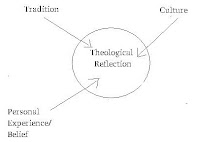An integral part of EfM (Education for Ministry) is the theological reflection: taking a thought, an incident or event, a text, an artifact (movie, advertisement, cartoon, picture, painting, sculpture, etc) or a belief, and creating a discussion that includes not just what is immediately evident but what lies behind it, what draws it in, what it means theologically. It's a way of learning to think theologically, to see theological overtones and implications in ordinary things as well as in those weighty tomes and liturgical practices that often have the word "Theology" attached. Theological reflection is a process that goes on in a community setting although it can also be done as an individual.
Many books on TRs bring in three main areas of input: tradition, culture and personal experience/ belief. Each has a place and adds to the depth of the conversation.
The Tradition source is that which comes from the past—scripture, church doctrine, church practice, other religions and religious texts, custom, and history—and the present, how the church and the community think and act currently. Much of tradition is the result of the hashing out of what a community or church believes, how it expresses and practices that belief and how it arrived at that belief, position or practice. The Bible is one aspect of Christian tradition while religious stories of the saints, legends, religious mythology (meaning, for me, stories of faith that may or may not be historically factual but in which truth is indelibly present) and texts such as the Book of Common Prayer create tradition in the religious sense.
The Culture component is comprised of those things which are encountered in the world. Movies, videos, books, magazines and advertisements, normal accepted practices within a specific group, and what the culture holds as important are parts of this source. Another form of tradition plays a part here as well since much of what is exhibited in a culture is that which they have derived and maintained from the collective past. Culture is continually changing, morphing as new discoveries, expressions, attitudes, practices and methods are made even though some aspects from the cultural tradition may remain viable and visible.
Personal experience also plays a part in the TR. This is where the personal history, events, knowledge, belief and position of the individual join that of the community with whom the conversation of TR is taking place. Personal includes tradition and culture through which the individual has grown, moved and changed, and how those things have formed the individual engaging in the TR conversation with others, all of whom have their own stories, strengths, knowledge, traditional and cultural input.
I think, though, that TRs based solely on these three elements, tradition, culture and personal experience, while valuable, somewhat miss the boat. One can meditate on one's own, sitting and contemplating the theological meaning of a beautiful scene, an artifact of some sort or even one's own navel lint but it can remain simply an intellectual exercise rather than something deeper with greater insights into a wider range. Even conversations in community can be intellectually stimulating but abstract. Much of the theological stuff which we study in EfM and elsewhere are the products of individual thought and reflection but it has seeped through the words of the thinkers into the language and customary of the religious society in which they lived, taught and worshipped. Some subsequently get discarded, others modified, and some remain more or less intact, but all came from one person's thoughts, beliefs, experiences, tradition and cultural expressions through conversation or interaction in some form with others
Hence EfM, in its wisdom, creates a fourth element to theological reflection.
The Action quadrant takes the input from the other three quadrants and creates a result, something that grows out of the discussion into some sort of fruitful way. Not content to just discuss an idea or belief, the action portion asks penetrating questions: How to going to use the insights and ideas that have been discussed and experienced in the conversation? What can be done with this knowledge? What does this all mean to one's ministry and life? Where will the insights be applied and who or what is needed to support this endeavor? Yes, the other sections do have questions attached to them, but it is a fact-finding mission, one to show where one is at a given point in time, how one got there, where one got the ideas in the first place and from where the insights, beliefs, experiences and knowledge came. Action turns it around. Instead of putting information in, it encourages a looking-outward, a stepping stone to future action and faith.
Where did I come from? Where was I taught to think/believe this or that? Who or what influenced me? How did I come to this point in life and faith? Where do I go from here? What can I do to implement new insights I have gained through these conversations? Where do I fit into the ongoing work of building the kingdom and how can I contribute to its success? EfM's emphasis on TRs may not get me there but it won't be for lack of guidance, structure or discussion. It gives me the tools --- but it's up to me (with God's help) to do something with those tools.
And to think I used to think of TRs as wasted time when I'd rather have been discussing the texts. That's growth for you.


you should post a link to this on our EfM course
ReplyDelete